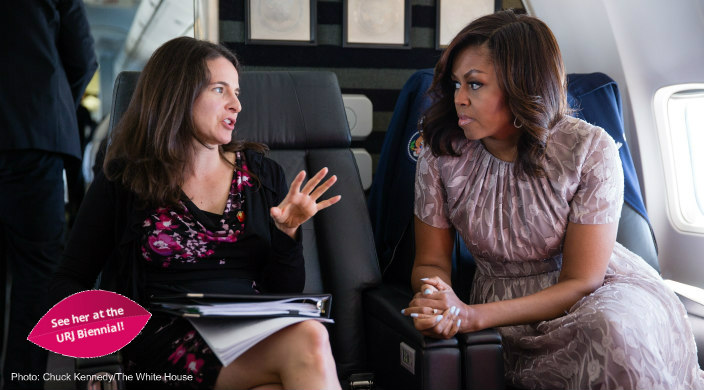
From 2009 to 2017, Sarah Hurwitz served as a White House speechwriter, first as a senior speechwriter for President Barack Obama and then as head speechwriter for First Lady Michelle Obama. She is the author of Here All Along: Finding Meaning, Spirituality, and a Deeper Connection to Life – in Judaism (After Finally Choosing to Look There).
ReformJudaism.org: You and Michelle Obama come from very different backgrounds. How did you capture her voice?
Sarah Hurwitz: I’ve found that what matters most in speechwriting isn’t sharing the same background or life experiences as the person you write for, but rather, sharing the same sensibility about what makes a good speech. And on that front, Mrs. Obama and I were in complete agreement that good speechwriting is about using personal, authentic, vivid language and telling memorable stories. And the best speeches are always an answer to the following two questions: What is the deepest, most important, most helpful truth I can tell at this particular moment? And, how can I tell this truth in a way that my audience can receive it?
Mrs. Obama knows who she is, she always knows what she wants to say, and she had so many beautiful answers to these two questions.
Your new book chronicles your Jewish journey from the time you rebelled and disengaged from Jewish observance after becoming a until your return years later. What compelled you to re-engage?
Growing up, my only points of contact with Judaism each year were two High Holiday services that I reluctantly attended and didn’t really understand, a or two, and a Hanukkah party. And if that’s all you see of Judaism, you won’t necessarily realize that it has a vast amount of wisdom to offer on how to be a good person, lead a meaningful life, and find spiritual connection.
What led me to re-engage was actually pretty random. I had just gone through a tough breakup, was looking for ways to fill my evenings, and heard about an Introduction to Judaism class at my local JCC. I signed up mainly just to have something to do, not out of some deep existential yearning. But the texts we studied in that class blew me away and made me realize that Judaism is a radical, inspiring, moving, and highly relevant tradition.
As I took additional classes and studied on my own, I was exposed to thinkers who offered ideas on theology and spirituality that resonated with me, as well as Jewish laws that set a much higher ethical bar than I ever would have thought to set myself. And once I started learning, I couldn’t stop.
You write that God was “the real sticking point” in your re-embrace of Judaism. How have you come to terms with the question of a divine presence in your life?
If you attend services twice a year and don’t have the extensive Jewish education necessary to understand the richness and complexity of the , you can easily get the impression that the Jewish God is a man in the sky who rewards and punishes us as we deserve and really enjoys our repetitive prayers to “Him.” And if you think your only choices are either that kind of deity or atheism/agnosticism, you’re probably going to go with the latter options.
But once I started learning about Kabbalah and Hasidism and studying thinkers like Buber, Maimonides, Heschel, and Kaplan, I realized that the choices are not man-in-the-sky or nothing. Judaism offers centuries worth of sophisticated insights about theology and spirituality, some of which resonate deeply with me. I also started attending silent Jewish meditation retreats, and my first retreat gave me a taste of what it might mean to have felt a sense of the Divine. Between those experiences and the learning I’ve been doing, I feel like I finally have a way of engaging meaningfully with Jewish spirituality.
You’ve said that you “approach Judaism as a speechwriter trying to find its beating heart for myself and others.” What are some of the speechwriting principles you’ve applied in your book to convince seekers that Judaism is worth choosing?
In the White House, I often worked with brilliant policy experts – folks who were deeply immersed in their subject matter. And if I was working on a speech about health care, a health care expert might say to me, “Our policy will bend the cost curve and improve the delivery system!” That’s great, but that’s not how most people think about health insurance. They want to know whether it will be affordable and actually cover the care they need.
That’s how I approach writing about Judaism – I focus on how it actually matters in people’s daily lives: How will it help them connect deeply with traditions handed down for thousands of years, and why does doing so matter today? How will it help them become more ethical, loving, decent people? How will it help them connect with God/the Divine/whatever language they’re comfortable using? All of that, I think, is the beating heart of Judaism.
Photo: Chuck Kennedy/The White House
Related Posts




